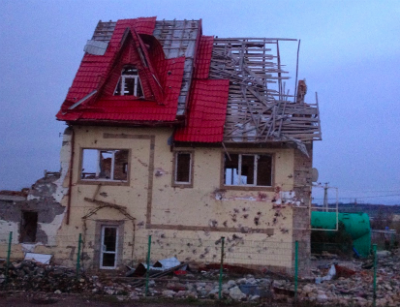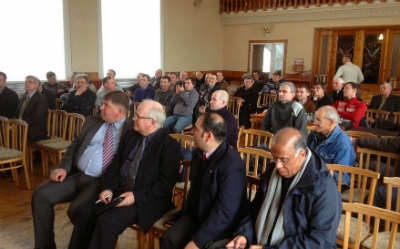A personal reflection on a journey through eastern Ukraine
European Baptist Federation General Secretary Tony Peck's thoughts on his visit to eastern Ukraine in April
Arriving in Ukraine a week after Easter (Orthodox date) I discover that the Easter greeting "Khrystos Voskres!" (Christ is Risen!) is not only said in church on Easter Sunday. It is said at any churches gathering throughout the whole Easter season. And it is used as a greeting of one Christian to another meeting in the street or elsewhere.
The answering response, "Voistynu Voskres!" (He is Risen Indeed!) seems to bring the reality of Christ’s resurrection right in to the midst of ordinary life, into the places where it really matters, and especially into Ukraine at a time of continuing crisis and conflict.
 The assertion that we make so easily in the West that we are Easter people living in a Good Friday world takes on a much deeper reality here. With leaders from the Baptist Union of Ukraine, four of us from the leadership of the European Baptist Federation travelled east for a round trip of 1600 km/1000 miles. We did not cross into the Occupied Zones, but in areas once in the hands of Separatists the evidence of the conflict that has torn this part of Ukraine apart was there for us to see in shelled buildings and abandoned homes.
The assertion that we make so easily in the West that we are Easter people living in a Good Friday world takes on a much deeper reality here. With leaders from the Baptist Union of Ukraine, four of us from the leadership of the European Baptist Federation travelled east for a round trip of 1600 km/1000 miles. We did not cross into the Occupied Zones, but in areas once in the hands of Separatists the evidence of the conflict that has torn this part of Ukraine apart was there for us to see in shelled buildings and abandoned homes.
We heard of life in the Occupied Zone (the so–called ‘republics’ of Donetsk and Luhansk) where the social infrastructure seems to have broken down completely. For instance it is no longer possible to pay pensions to the elderly. Hospitals are not functioning properly.
Back in Kiev we saw a demonstration outside the Rada (Parliament) by miners from the occupied zones asking the Ukrainian government still to pay for government support for the regions that are now controlled by separatists.
In Severodonetsk we met Olga Lishyk, the Assistant Governor of the Luhansk province that has had to move its administrative centre because of the conflict. She described the many needs of the IDPs in her region, and expressed to Baptists and other church groups that were among the first to care for these refugees. This is a huge problem.
According to the New York Times/UN there are now over 1 million IDPs in the part of the Donbass still controlled by the Ukrainian government, in Kharikv, Kiev and elsewhere. The recent report of the Ukraine NGO Forum speaks of 1.6 million people in need of help in the affected oblasts (regions). With priorities of food, health and shelter as well as protection, safety and dignity.
And what of our Baptist churches in the region? In Severodonetsk we met pastors form the Luhansk region. Those in the Occupied Zone had travelled up to nine hours to get to the meeting, having been turned back at various checkpoints. I was invited to preach and chose Hosea 11 about the God who never gives up on his people and goes on loving them whatever the circumstances. Helle, Asatur and Rupen were able to bring similar messages of encouragement, that our brothers and sisters who are suffering and in great need are not forgotten.

We heard from pastors in both Kharkiv and Luhansk about how they were caring for the practical and spiritual needs of the IDPs. In some cases they spoke of the initial reluctance of the churches to reach out to the refugees, but then of how hearts became open, attitudes changed and how the whole experience had changed their church.
One pastor spoke more personally and in a profound way. He said, ‘When we somebody else’s pain on to ourselves, it changes us’. The EBF team reflected on this afterwards and linked it with the assertion by the theologian Jürgen Moltmann (in The Crucified God) that God himself is not unaffected by the pain of the world that he took on himself at the cross of Christ .
Nearly all the pastors testified that as their churches opened their doors and their hearts to the refugees, the gaps left in the churches by those who had left the region because of the conflict had begun to be replaced by those seeking spiritual help as people traumatised by the Crisis. I dared to believe and hope that through this experience the pietism that sometimes tries to separate the spiritual realm from the world was giving way to a deeper understanding of how God is acting in this situation to establish his Kingdom. The light of resurrection breaking though into the Good Friday world.
Then it was back to Kiev to join the weekly prayers and Bible Study group at the Rada (Ukrainian Parliament). We read together the accounts of the Resurrection in the Gospels and reflected on what that meant for us personally and for the life of Ukraine and its parliament.
We met with Baptist Members of Parliament and also an adviser to the President on religious freedom. I had been reading the article by Baptist Michael Chernenko on the way in, which some see this conflict as kind of ‘holy war’ with any who are not affiliated with the Russian Orthodox Church being open to attack and discrimination, and being driven form their homes in the Occupied Zones.
On our final morning we went to meet Michael Chernenko and his Mission Eurasia team in their Ukraine offices near to the Baptist Centre in Irpin. Theirs is a thoughtful, theologically-literate progressive voice in the whole region, and they are trying to interpret what is happening in Ukraine, as well as engaging in practical ministries of compassion and aid, and building up leadership for the future.
President Poroshenko’s video Easter message was of various people in different parts of Ukraine declaring that ‘Christ is Risen!’ We have to believe this so far as eastern Ukraine is concerned; that there is hope beyond the current despair, and the possibility of reconciliation beyond the estrangement of people form one another in this current conflict.
Of course, I reflect especially on the strained relations between Russian and Ukrainian Baptists at the present time and what we can do as the EBF to provide a space for a coming together, and ultimately healing and reconciliation. That will not be easy and will take time and some truth-telling on both sides.
Immediately I returned from Ukraine I was engaged in my contribution to the London Conference on Ukraine, organised by BMS World Mission and Mission Eurasia, that took place on Tuesday 28 April at Lambeth Palace in London. My subject was to speak about possibilities for reconciliation in the current crisis.
On our journey through Ukraine I was a challenged to consider whether we can speak of reconciliation at all at this time. Sometimes it may be better to keep silent and wait for a God’s ‘kairos’ moment that will surely come. But I am sure that even now the churches in Ukraine and Russia, and those of us who serve organisations such as EBF that bring them both together can be open to God for ways to prepare way for reconciliation.
If the Cross and the resurrection mean anything to us, then surely it is summed up by Paul in Ephesians 2, that ‘Christ is our Peace…he has broken down the dividing walls at the Cross…. He has reconciled both groups to God in one body through the cross, thus ending the enmity between them.’
Amen, may it be so, Lord.
The Revd Tony Peck is General Secretary of the European Baptist Federation. This article was originally published on Tony's blog Europe Matters and is reused with permission
Baptist Times, 07/05/2015